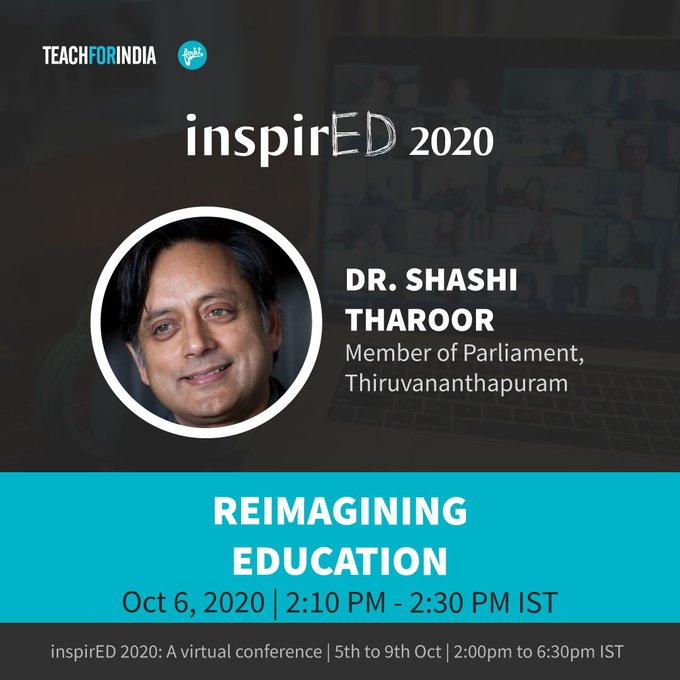“When we reimagine education, we must imagine it for everyone’, Dr Shashi Tharoor shares his vision at inspirED 2020
New Delhi: Day 2 of inspirED 2020 kick-started with Dr. Shashi Tharoor’s session on reimagining education for everyone. As someone who has served as a Union Minister, an MP and the undersecretary of the United Nations, Dr. Tharoor shared several insights around his vision for India’s children in the light of the new National Education Policy. He drew the audience’s attention to the fact that to reimagine education, we must imagine what an excellent education will look like for vulnerable communities.
Dr. Shashi Tharoor started off by describing the challenges that we as a nation face due to the onset of the COVID-19 pandemic and how it disrupted society, especially those in the informal sector, by changing their livelihood, economy and everyday life. The pandemic has naturally led to a global phenomenon of school closures and learning to shift online for the foreseeable future. While it’s challenging for a child to stay focused in digital classrooms for longer hours, educators who are excellent otherwise are also struggling to command the attention of these online classrooms. He highlighted the fact that this change, however unprecedented, is inevitable and this has severely affected students, especially those from low-income backgrounds. “ There are people in our country, who not only can’t afford a computer at home, don’t have a laptop or don’t even necessarily have a mobile phone. If they have a phone, it’s not smart enough for digital learning and if they have a smartphone, most of them don’t have access to a fast internet data pack”, he added, “societies around the world have had to deal with historic dividers of poverty and inequality, and as we move towards greater digital activity, there’s no question that we must recognize the strong digital divide that exists.”
The former minister of Human Resources then captured the need of the hour – the educationists and education policymakers can’t ignore the harsh reality of the vulnerable, weaker sections of society. “The sudden push to all digital learning has left a number of our students and their families in considerable stress,” he said. He expressed his deep concern, how for most low-income groups, education is the only way to improve living standards and how the digital divide can hinder this journey. He added, “when we reimagine education, we must imagine it for everyone. Our imagination must embrace the marginalised, the vulnerable families who are naturally disproportionately affected by our current push towards digital learning.” He then raised a very relevant question on how, amidst this very challenging shift, we can prepare our kids for careers that don’t even exist currently. While his generation experienced an education system that was all about absorbing as much information, he mentioned that today, we need children who have well-formed minds, who can do critical thinking, problem-solving, decision making and communication for them to be 21st century-ready.
Mr. Tharoor also shared his perspective on the latest National Education Policy. He expressed his optimism in suggestions such as removal of the rigid separation between streams, the introduction of recreational subjects in classrooms and even changing the university interface that would enable universities to work with organisations and companies in relevant industries. He wholeheartedly welcomed the move to include more extra-curricular subjects in school education so that a child who is excellent in arts and maths can continue pursuing both. He also seemed hopeful about recreating a seamless structure between universities and industries to ensure there’s a mutual exchange of knowledge and grants. However, he pointed out that there are lofty goals and targets in the NEP without a clear route map such as 50% gross enrollment for higher education and 100% secondary school enrollment. He raised relevant questions on how we can achieve these goals without high-quality teachers, retaining students and an increase in resources as well as questioned how we can get more qualified teachers to fill the gaps in schools and colleges. “The reality of Indian school infrastructure shouldn’t be glossed over, how many schools don’t have toilets for girls?”, he asked.
He concluded on an optimistic note of reimagining education for everyone, to create a better future and wished everyone at inspirED an opportunity to change our tomorrow.

